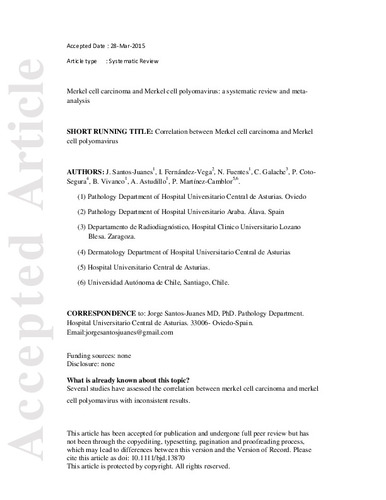Merkel cell carcinoma and Merkel cell polyomavirus: a systematic review and meta-analysis
Editor/Coord./Trad.:
Subject:
Merkel cell carcinoma
Merkel cell polyomavirus
Publication date:
Editorial:
Oxford Academic
Citación:
Abstract:
Several observational studies have assessed the correlation between Merkel cell carcinoma and Merkel cell polyomavirus with variable results. The objective of this systematic review was to determine whether there is a correlation between Merkel cell carcinoma and Merkel cell polyomavirus. Studies assessing the relationship between Merkel cell carcinoma and Merkel cell polyomavirus from January 2008 to August 2014 were pooled from Medline, Embase, PubMed, Cochrane Database of Systemic Reviews and Google Scholar. From each study we collected the first author's last name, publication year, country of origin, type of study design, characteristics of participants, possible variables incorporated into the multivariable analyses and the risk ratio (RR) for Merkel cell carcinoma associated with Merkel cell polyomavirus combined with the corresponding 95% confidence interval (CI). Methodological assessment of the study was evaluated using the Newcastle-Ottawa scale. Crude RR was calculated from the data provided in each article. Meta-analyses for the global RR and for the proportion of positives in both case and control samples were performed. In addition, in order to explore the sources of heterogeneity among the studies, meta-regression and sensitivity analyses are also provided. A total of 22 studies were identified for the analysis. The pooled RR from random-effects analysis was determined to be 6.32 (95% CI, 4.02-9.93). Global proportions of positive samples were 0.79 (95% CI, 0.72-0.84) and 0.12 (95% CI, 0.08-0.19) in the case and control groups, respectively. The findings support the association between Merkel cell carcinoma and Merkel cell polyomavirus. However, a non-negligible percentage of positive results have been identified in controls. Some caution must be taken in the interpretation of these results because heterogeneity between studies was found.
Several observational studies have assessed the correlation between Merkel cell carcinoma and Merkel cell polyomavirus with variable results. The objective of this systematic review was to determine whether there is a correlation between Merkel cell carcinoma and Merkel cell polyomavirus. Studies assessing the relationship between Merkel cell carcinoma and Merkel cell polyomavirus from January 2008 to August 2014 were pooled from Medline, Embase, PubMed, Cochrane Database of Systemic Reviews and Google Scholar. From each study we collected the first author's last name, publication year, country of origin, type of study design, characteristics of participants, possible variables incorporated into the multivariable analyses and the risk ratio (RR) for Merkel cell carcinoma associated with Merkel cell polyomavirus combined with the corresponding 95% confidence interval (CI). Methodological assessment of the study was evaluated using the Newcastle-Ottawa scale. Crude RR was calculated from the data provided in each article. Meta-analyses for the global RR and for the proportion of positives in both case and control samples were performed. In addition, in order to explore the sources of heterogeneity among the studies, meta-regression and sensitivity analyses are also provided. A total of 22 studies were identified for the analysis. The pooled RR from random-effects analysis was determined to be 6.32 (95% CI, 4.02-9.93). Global proportions of positive samples were 0.79 (95% CI, 0.72-0.84) and 0.12 (95% CI, 0.08-0.19) in the case and control groups, respectively. The findings support the association between Merkel cell carcinoma and Merkel cell polyomavirus. However, a non-negligible percentage of positive results have been identified in controls. Some caution must be taken in the interpretation of these results because heterogeneity between studies was found.
DOI:
Collections
- Artículos [37321]
- Cirugía y Especialidades Médico Quirúrgicas [311]
Files in this item





